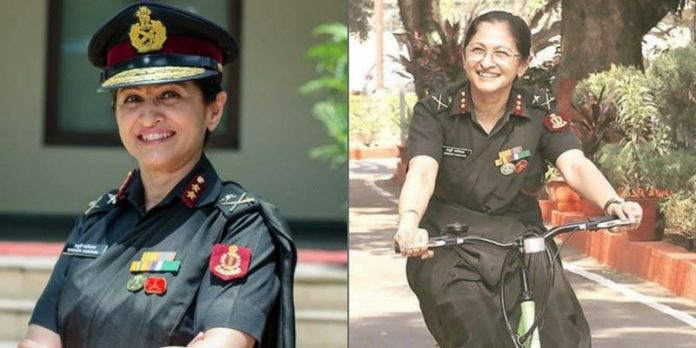Madhuri Kanitkar did not dream of joining the army while growing up. In fact, she did not even know about Armed Forces Medical College (AFMC), until she was in Class XII. Yet, she ended up becoming an army doctor and now Deputy General Madhuri Kanitkar is the first woman dean of her alma mater – AFMC, Pune.

When it comes to qualifications, few have these many. VSM, MBBS, MD (Paediatrics), DNB (Paediatrics), Fellowship Paediatric Nephrology, FIAP, Fellow FAIMER. Major General Madhuri Kanitkar has achieved what few have been able to. She stands tall in a field that is male-dominated, and has definitely made her mark. Seeing her accomplishments, one figures that she might have decided to join the army much earlier in life. She laughs, “No. I was studying in Fergusson College as a 12th standard student and I planned to do medicine. I had friends in NDA and I used to see that there is something different and smart about them. And I had a roommate who was from an air force background. So, she was keen to join AFMC (Armed Forces Medical College, Pune) and that was the first time I heard about it. So, I came with her (to the college) and saw the distinct difference and the neatness, cleanliness, discipline somehow really impressed me.”
Early beginnings
Getting into AFMC isn’t a cakewalk. But if you have the merit and the marks, you can get in. Did she have family support? “Honestly, I didn’t even tell my parents that I’m joining AFMC. I wrote my father a letter after getting selected and joining the college.” Things didn’t go her way and she had to join BJ Medical College in Pune instead. But her heart was with AFMC. She was keen on going back as firstly, it “was the armed forces, and secondly, I met my future husband (there).” After a huge tantrum at home, “my dad let me come back to AFMC with the condition that when I pass out, he will not pay my bond money and I must join the armed forces.” And the rest is history.
At AFMC, she underwent her medical training where she got to “to enjoy becoming a good doctor”. Then, came the military training in Lucknow. “From early morning, we were made to do what we call the Battle Physical Efficiency Test (BPET), where you’re supposed to run five kilometres and do rope climbing, jump a ditch, etc. That was great fun and it was the first time we got to train on weapons, firing, marching and other such things. It was exciting.”

You won’t find many women officers at high ranks in the army though. “20 girls passed out and went for internship. Post this, some left for marriage. Another half of them left after five years of commission and finally for what we call a permanent commission, we were just six to seven of us who remained. Of all of them, today I am the only one who has remained (in the army)!” Why didn’t more women stay back in the army? “I think the majority of my fellow women batch-mates left because at that point they didn’t have such a woman-friendly policy like posting the spouses together. I think that is a very tough call for a lady to take. Besides, you have to move every two years and then you have to do night duties and you have children to bring up. So balancing all that gets difficult! So, I think that maybe one of the major reasons that women did leave. But things have changed now. They are helping much more. By and large, spouse co-location has become a norm.”
Despite having traversed through it and come out successfully, the journey hasn’t been easy. “Ours was the first batch to be commissioned out, even before internship. I was posted in the outskirts of Jodhpur in Rajastan for my first commission. We had a field ambulance and not a hospital as such. The officers stay in a long barrack called bashas with temporary roofs as it was a mobile temporary unit.” The officers in the division posted there, including the General Officer Commanding were first amused that a woman was posted, and felt that a lady shouldn’t have to stay in these barracks. They asked her to stay in the main headquarters of the area in Jodhpur. But, she didn’t agree. “I said if I am posted here, I’m going to stay with them. If tomorrow there’s a war, I’m going to go out with them.” In the army, “your whole training and grooming is to be an officer aka a gentleman, and a lady wife is lady wife. So, having an officer who is a lady is something which the armed forces was not used to at that time. So, everyone took a little time to adjust specially in the field.” It took some time but “after some time they stopped thinking of me as a woman, then they looked at me as an officer.”
Since then she was posted all across the country, “Assam, Guwahati, Arunachal, right up to Bumla, Sela, Tenga; from south (India) to the north. It was either my own posting that I went to different places for, or to where my husband was posted where I visited during holidays.” She successfully completed each commission, even while raising two children, Nikhil and Vibhuti. The family, though, did not get to stay in one place for much time, “in the 35 years of marriage, we have been posted together only 12 years!” But, she had the support of her parents, in-laws and family. “I think most importantly both my kids understood and accepted that dad’s not there and mom’s busy. There were times when they made me feel guilty; then I used to openly ask ‘do you want me to quit and sit at home’. They would say ‘No! Don’t do that. Full-time mom nahi chahiye!’” she laughs.

On the professional front, she is the first trained paediatric nephrologist of the arm forces and has single handed setup units to monitor kidney ailments in Pune and Delhi. This too she did despite the odds. She did not get initial support to super-specialise in the subject, “I used my own earned leave and short fellowships, to work at centres like All India Institute of Medical Sciences. The determination that I was spending all my leave to train and that is helping take care of patients gave me the strength to not give up. Finally, I was given study leave and that’s how I did my initial training. I realised that we don’t have ambulatory dialysis for children in India. I found that a course in Singapore had it. So, I went and spent four months there and trained. I then got a scholarship from the Royal College, UK.” She trained in London in urinary bladder dysfunctions. Her self-study through the years helped her setup the centres in the armed forces. “After that, it was easier,” as there was a visible difference in patient care. This led to the course being taught in AFMC, Pune. Today, “five of my students are now trained in paediatric nephrology.”
Training the new generation
Now, back as the Dean to her alma mater, and the first woman Dean to take the reins, she has ensured that the strong history of the college continues and achieves newer and better milestones. “The college as far as training and academic is really one of the top colleges in the country; but where I think we need to advance the training is in the field of research. The higher authorities have been very kind to accept our proposal of setting up a separate research unit at AFMC dedicated to inculcating research into the minds of youngsters. You can’t start at an old age to begin to think innovatively. Secondly, I have set up a very strong counsellor cell at AFMC called Umang. They have now started doing very well. We had this council of psychologists but now I have created a very student-friendly facilitating and workshops for them for de-stressing. Another venture we are trying to start is an in-house crèche. This was something I myself found really difficult bringing up the children. I feel that more young ladies need this kind of a setup so we are trying to set up a crèche in the college campus. We are also looking to strike that balance between training, academics and extra-curricular.” AFMC has a host of extra-curricular activities like sports, arts and crafts, and a plethora of options in each. They also have a scientific festival called Illuminati which is like a marathon race of innovation. “I am giving back to the students of this college, what I got to experience as a student here.”
Talking of what future holds for her, in five years’ time, she shares, “I’ll most probably be retired, so I’d like to spend, devote more time to giving back to society. I am currently giving 80% of my time to profession, and 20% to the other things. Post retirement, I will reverse it; though I can’t just be sitting idle. I think I’ll distribute my time with 20% for profession, of it 10% to education and 10% for patients, and 80% for relaxing, taking up hobbies, and spending time with family.”
Her clarity of thought and determination shines through out her journey and her future vision. Being one of the very few, if not the only, to have achieved what she has, she is an inspiration to many young ladies.




















































